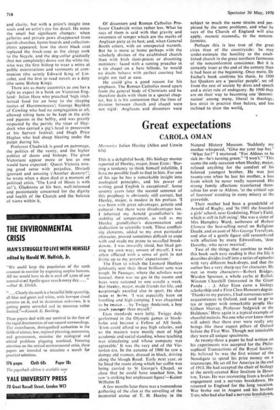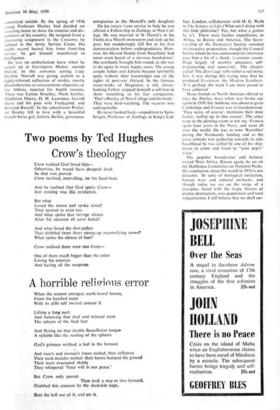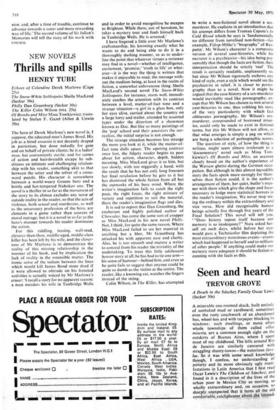Great expectations
CAROLA OMAN
Memories Julian Huxley (Allen and Unwin 63s) This is a delightful book. His biology master reported of Huxley, major, from Eton : 'Bar- ring a tendency to think himself infallible, I have no possible fault to find in him. For one of his age he has a remarkable insight into zoological principles, and his power of writing good English is exceptional'. Some seventy years later the second sentence of
this prophecy is obviously still correct, but Huxley, major, is modest in his preface. 'I was born with great advantages, genetic and cultural—but there were disadvantages too. I inherited my Arnold grandfather's in- stability of temperament, as well as my Huxley grandfather's determination and dedication to scientific truth. These conflict- ing elements, added to my own particular character, proved sometimes difficult to cope with and made me prone to so-called break- downs. I was inwardly timid, but liked get- ting my own way; unsure of myself, I was often afflicted with a sense of guilt in not living up to my parents' expectations.'
The Eton to which the Leonard Huxleys jubilantly sent their three brilliant sons was tough. In Passages, where the scholars were housed. there was no gas in the rooms and boys were rationed to one candle a week. But Huxley. major, made friends for life, and surprisingly excelled also in sport. He shot twice at 'thslIN. 'I was especially keen on hurdling and high-jumping. I was chagrined to be beaten . . by Twiggy Anderson, a boy much younger than myself.'
Eton standards were lofty. Twiggy duly performed in the Olympic games at Stock- holm and became a Fellow of All Souls. 'Eton could afford to pay high salaries, and so the masters were mostly men of high academic and social standing, whose teaching was stimulating and whose company was agreeable.' It was the very end of the Vic- torian era. In the autumn of 1900 he saw a dumpy old woman, dressed in black, driving along the Slough Road. Early next year, as he lined the route along which her coffin was being carried to St George's Chapel, so close that he could have touched him, he saw 'a striking but unpleasant figure'—Kaiser Wilhelm II.
A few months later there was a tremendous gathering of the clan at the unveiling of the memorial statue of T. H. Huxley in the Natural History Museum. 'Suddenly my mother whispered, "Give me your top hat."
"What for?" I muttered. "For Aldous to be
sick in—he's turning green." "I won't" ' This seems the only occasion when Huxley, major, refused anything for the comfort of his beloved youngest brother. He was just twenty-one when he lost his mother, a loss from which he never really recovered. His strong family affections transferred them- selves for ever to Aldous, 'at the critical age of fourteen' standing in stony misery at the graveside.
Their mother had been a grandchild of Arnold of Rugby, and 'In 1901 she founded
a girls' school, near Godalming, Prior's Field, which is still in full swing'. She was a sister of Mrs Humphry Ward, authoress of Robert Elsmere the best-selling novel on Religious Doubt, and an aunt of Mrs George Trevelyan, and also of a gentle figure still remembered with affection by many Edwardians, 'dear Dorothy, who never married'.
Two of the things that combine to make this book such easy reading is that the life it describes divides itself into a series of episodes with very different back-drops, and that the author has a very sharp eye for character. He met so many characters—Robert Bridges, Warden Spooner, a whole cache at Balliol, Winston Churchill (interested in the Giant Panda . . .). After Eton came a biology scholarship and a First Class Honours degree. 'Thanks to my parents, I had numerous senior acquaintances in Oxford, and used to go to tea or supper with remarkable people like Gilbert Murray, Professor Sedgwick or the Haldanes.' Here again is a typical example of cheerful meiosis. No one who ever knew them will admit that there ever were really any beings like these august pillars of Oxford before the First War. Though not inimitable they were all unique specimens.
At twenty-three a paper he had written on his experiments was accepted for the Philo- sophical Transactions of the Royal Society. He believed he was the first winner of the Newdigate to spend his prize money on a microscope. He set off for America in the end of 1913. He had accepted the chair of biology at the newly-created Rice Institute in Hous- ton, Texas. He was recovering from a broken engagement and a nervous breakdown. He returned to England for the long vacation. War broke out in August and his brother Trey, who had also had a nervous breakdown,
committed suicide. By the spring of 1916 %oung Professor Huxley had decided on returning home to share the miseries and dis- comforts of his country. He resigned from a frustrating assignment in the Customs; he enlisted in the Army Service Corps. His health record barred him from front-line service: he got himself transferred to Intelligence.
He was on embarkation leave when be turned up at Garsington Manor, outside Oxford. In this romantic setting Lady Moline Morrell was giving asylum to a highly-talented collection of misfits, mostly Bloomsburyites or conscientious objectors, or like Aldous, rejected for health reasons. There was Lytton Strachey, Mark Gertler, Middleton Murry, D. H. Lawrence, Gerald Shove and his poet wife Fredegond, and Bertrand Russell.' In the schoolroom Profes- sor Huxley fell in love with a beautiful French-Swiss girl, Juliette Baillot, governess-
companion to the Morrell's only daughter.
On his return from service in Italy he was offered a Fellowship in Zoology at New Col- lege. He was married at St Martin's in the Fields in a March snowstorm and took up his post, but maddeningly fell flat at his first demonstration before undergraduates. How- ever, his blessed blonde from Neuchatel 'had never even heard of a nervous breakdown'. She resolutely brought him round, as she was to do again in many happy years. The young couple Julian and Juliette became (probably quite without their knowledge) one of the sights of post-war Oxford. In the famous water-walks of Magdalen, a tall, clever- looking Fellow stopped beneath a tall tree to show something to his fair companion. That's Huxley of New College and his bride.' They were bird-watching. The vignette was unforgettable.
He never looked back—expedition to Spits- bergen, Professor of Zoology at King's Col- lege, London, collaborator with H. G. Wells in The Science of Life ('What am 1 doing with this little philistine? Yes, but what a genius he is'). There were further expeditions, to Africa, to Russia and America. The Secre- taryship of the Zoological Society sounded an attractive proposition, though the Council before whom he was summoned for interview gave him a bit of a shock, 'a curious assem- blage largely of wealthy amateurs, self- perpetuating and autocratic'. The chapter called The Zoo Cage' tells rather a sad story. Yet, it was during this trying time that he produced Evolution. the Modern Synthesis. it is perhaps the work I am most proud to have achieved ' Many friends in North America offered to take the Huxley boys when war broke out again in 1939, but Anthony was about to go to Cambridge and Francis was at Gordonstoun. They were, of course', mentions their stoic father, 'called up in due course'. The elder went to the plotting room at RAF HQ. 'Francis spent four years in the Navy, and went all over the world. He was in HMS 'Ramillies' during the Normandy landing and as the great armada was gathering towards its epic beachhead he was called by one of his ship- mates to come and listen to "your pop's" voice.'
The popular broadcaster and lecturer visited West Africa, Russia again, he sat on the Hobhouse Committee on National Parks. His conclusion about the world in 1970 is not defeatist. 'In spite of biological extinction, human wars and cultural set-backs, and though today we are on the verge of a precipice, faced with the tragic threats of atomic destruction, over-population and total vulgarisation, I still believe that we shall sur-
vive, and, after a time of trouble, continue to advance towards a saner and more rewarding way of life.' The second volume of Sir Julian's Memories will tell the story of his work with UNESCO.




































 Previous page
Previous page